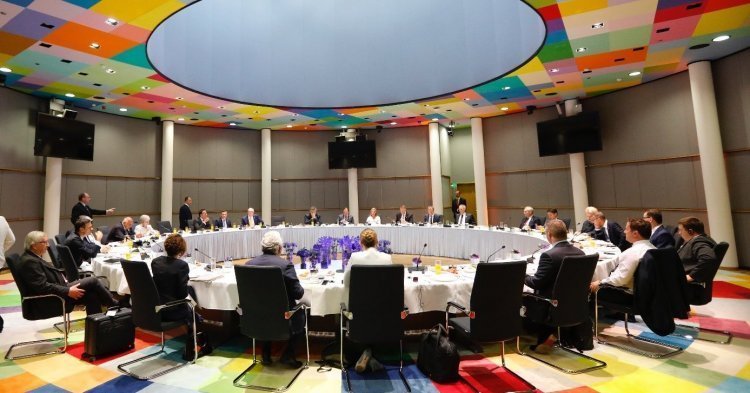The night was exceptionally long for the European heads of state and government who gathered at the extraordinary European Council meeting in Brussels starting from the end of the afternoon on 30 June. The objective of this meeting was to find a compromise on the nominations to positions of high responsibility in the EU (top jobs), whose mandates came to an end with the European elections on 26 May.
Among the negotiations was the nomination for the European Commission presidency, that of the European Parliament and of the European Council, as well as the High Representative of the Union for Foreign Affairs and Security Policy. The President of the European Central Bank, for its part, was to be nominated later.
The Spitzenkandidaten issue
In accordance with European treaties, the European Council proposes a candidate for European Commission presidency by reinforced qualified majority (72% of Member States representing 65% of the population), “taking into account the outcome of the European elections”.
This candidate will then have to be voted by a majority of the Members of the European Parliament. Even if the agenda for the meeting seemed simple - agreeing on the names of the persons leading the EU in the next years - the institutional, political and intergovernmental equilibrium on the choice of names is at its highest level of complexity. Indeed, one has to take into account the nationalities, leanings, territorial disparities and gender equality, as well as fixed criteria for European leaders.
In 2014, the Spitzenkandidaten principle reinvigorated the influence of European political parties and of the European Parliament through the choice of lead candidates who would be subjected to a vote in the Parliament. It’s through this system that Jean-Claude Juncker was elected - the current European Commission President who now relishes in the difficulty of replacing him.
At the European elections, the European centre-right (European People’s Party, EPP) chose Manfred Weber as its Spitzenkandidat, while the Social Democrats (S&D) rallied behind Frans Timmermans. The liberals (Renew Europe, ex-ALDE), for their part, made a “Team Europe” with a number of names, including the Dane Margrethe Vestager. Even if the European Parliament has on several occasions in its resolutions rejected any proposed candidate who isn’t a Spitzenkandidat, that’s not the case for the European Council which already refused Weber, Timmermans and Vestager in an earlier summit in mid-June.
Fixed criteria on competence, experience and equality
French President Emmanuel Macron presented his conditions for the nomination for European Commission, which included competence for the job, governmental and European experience worthy of the post, and an equality in the top jobs that are nominated by the European Council. This made Frans Timmermans, Margrethe Vestager and Michel Barnier (the EU’s Brexit chief negotiator) his favourites, and eliminated Manfred Weber who was the candidate supported by the German Chancellor Angela Merkel.
A first compromise around the Franco-German couple at the G20 summit in Osaka allowed for uniting the Dutch Prime Minister Mark Rutte, Emmanuel Macron, Angela Merkel and the Spanish Prime Minister Pedro Sánchez behind Frans Timmermans. Angela Merkel thus abandoned her favourite Manfred Weber, all the while balancing the political game with her national coalition with the Social Democrats.
However, no majority shaped behind Timmermans at the previous European Council meeting on 20 and 21 June. Timmermans, the polyglot First Vice-President of the European Commission and the former Dutch foreign minister, worked in favour of rule of law during his mandate, at the risk of vehement criticism from Polish and Hungarian governments.
The “Visegrad” group (Slovakia, Czech Republic, Poland and Hungary) are thus firmly opposed to Frans Timmermans. Besides, some centre-right heads of government (Croatia, Latvia and Cyprus) were opposed to proposing a social democrat, given that the EPP came out of the European elections as the winner. As for Italy and its Prime Minister Giuseppe Conte, a game of balance is ongoing to get as much as possible out of the package of nominations. From this starting point, no required majority emerged and the European Council could only admit failure.
Nonetheless, numerous European leaders underlined how close they were to finding a compromise. Several schemes for proposals on candidates came up on many occasions during the night and the morning, punctuated by informal negotiations and plenary meetings.
One proposal making rounds in the morning was as follows: the Dutch Timmermans (S&D) for Commission, the Bulgarian Kristalina Georgieva (EPP) for European Council, the Danish Margrethe Vestager (Renew Europe) or the Belgian Charles Michel (Renew Europe) for High Representative and/or First Vice-President of the Commission, as well as Manfred Weber (EPP) and Guy Verhofstadt (Renew Europe) splitting the European Parliament presidency.
European Council, the gatekeeper?
If the Member States are in such rush to find consensus on the positions of power, it’s because the institutional equilibrium between political parties and the nationalities of nominees also includes the President of the European Parliament who has to be elected during the first plenary session in Strasbourg, opening starting from the morning of Tuesday 2 July.
On the agenda, the election of the President has been planned for Wednesday, as the political parties are conducting their last negotiations on the division of committees, vice presidents, Questors and other positions of responsibility inside the Parliament. This gives a short respite for the heads of state and government to find agreement.
Underlining the failure of the negotiations and the lack of cooperation displayed by some of his colleagues, Emmanuel Macron said in front of journalists at the exit from the Council building that “our credibility is profoundly tarnished with these overly long meetings which don’t result in anything. We give an image of a Europe that is not serious”. A tired-looking Luxembourgish Prime Minister Xavier Bettel counted the number of hours spent on negotiations throughout the night, while the Chancellor Angela Merkel underlined the importance of finding an “interinstitutional compromise” that would satisfy all European equilibria.
This European Council meeting, which started at the end of June and ends in July, will be remembered as one of the longest in history. As the record from during the Greek crisis of 2015 (17 hours of negotiations) was beaten, numerous exhausted voices appealed for a reform on the process of deciding nominations in the European Council. A deep reform of intergovernmental methods to obtain “a more democratic and more efficient advance of our collective functioning”, in the words of Emmanuel Macron.
If there is to be reform, it should be inspired by a classic parliamentary model where the Prime Minister (President of the European Commission) comes from the ranks of the majority that rests on a programme unifying numerous parties behind a coalition. If the European Council doesn’t reach a compromise quickly, it risks losing its edge in the calendar of nominations - as the Parliament would have an even more considerable weight in the balance of negotiations. The EPP, S&D, Renew Europe and the Greens now have plenty of influence to exercise to facilitate finding a balance, without necessarily depending on the weight of the EU’s member states.


Follow the comments: |
|
